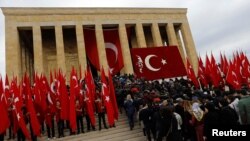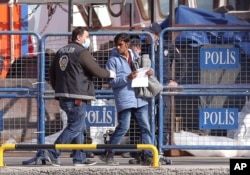Thorbjorn Jagland, the head of the Council of Europe, a top European rights monitoring group, met with Turkey’s political leaders Thursday to discuss Europe’s growing concern about the state of the country’s human rights.
On Wednesday, the European Union, at its annual Progress Report on Turkey’s bid to join its ranks, used unprecedented language to criticize the country’s rights record. An ongoing crackdown since July’s failed coup has drawn some of the harshest criticism.
Turkey’s decade-long EU bid is no stranger to criticism, but analysts claim the scale and language used is something new, “There has been difficulties in the relationship in the past,” notes Sinan Ulgen, a visiting scholar for Carnegie Europe. “But both the level of negativity of the rather euphemistically called Progress Report and the accompanying calls from different members of European institutions to suspend the negotiations, in that sense this is a quite a toxic environment," he said.
Ankara has dismissed European countries' concerns, accusing them of double standards and failing to understand the threat to democracy it is facing. Turkish President Recep Tayyip Erdogan even mocked the threat to Turkey’s EU bid.
“They shamelessly say that Turkey’s EU negotiations should be reviewed. You are late. Review it as soon as possible. But do not just review, make your final decision,” Erdogan said Wednesday.
Ankara’s bid started back in 1963, when it applied to join the EU’s forerunner, the EEC. There is widespread belief its bid is blocked in part because of the country’s Muslim identity, “The EU needs to be fairer. It needs to think about itself more” declares Ayse Sozen Usluer, President Erdogan’s chief of international of relations. “Up until now Turkey has been blocked by political concerns of some countries, not because of technical problems in the negotiation process,” she said.
There still remain powerful forces on both sides that prevent a total collapse of the talks, argues analyst Ulgen.
“One reason is the ongoing challenge of managing refugee flows where Turkey plays an invaluable role. Secondly there is also the prospect after many years of a settlement in Cyprus with the ongoing talks on the island. The Turkish government also understands that despite this heavy rhetoric, Turkey does not need anymore bad news given that the domestic situation is quite challenging, but so is the economic situation.”
Refugee agreement at risk
But Ankara is upping the stakes, warning that by the end of the year it could end an agreement with Brussels to control refugees seeking to enter the European Union.
Erdogan is also pushing for the re-introduction of the death penalty. That would automatically lead to a suspension of membership talks.
Brexit, the United Kingdom’s decision to leave the European Union, could become a powerful impetus to Ankara ending its membership talks. “Brexit is going to be an interesting model for Turkey,” says advisor Usluer. “If they [the UK] are able to make a trade agreement between [the] EU, Turkey may choose this model and continue its relationship with the EU in the limits of this model.”
Such a move would likely cause further alarm among critics of the government and supporters of the secular state who view the European Union membership bid as an important anchor for fundamental rights and the country’s Western orientation. But analysts suggest any move away from Europe would probably lead to a closer alignment with Washington.
“One way or another Turks realize they need a relationship with the West and they have used America and Europe against each other in the past,” observes Semih Idiz, political columnist for Turkey’s Hurriyet Daily News and al-Monitor website. “So deterioration in relations with Europe will provide a window of opportunity for improving ties with America,” he said.
Trump's election
While Ankara has its differences too with Washington, in particular over Syria, the election of Donald Trump is already being seen as an opportunity to reset relations.
Erdogan was among the first to phone Trump to congratulate him on his election victory. A statement issued by the Turkish presidency said both men,“expressed their commitment to further strengthening bilateral relations, [and] continue their close cooperation on regional and international issues, including the fight against terrorism.”










